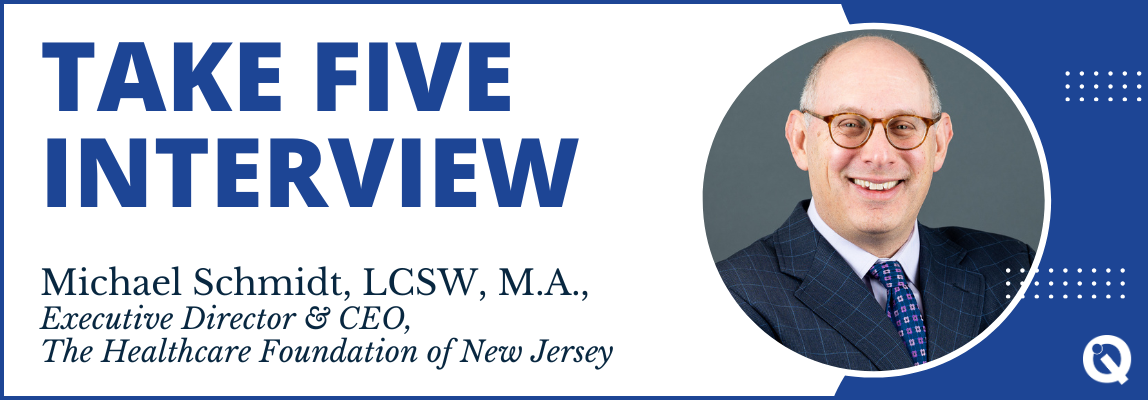 Michael Schmidt, LCSW, M.A., Executive Director/CEO of The Healthcare Foundation of New Jersey, a generous funder of the Quality Institute’s work on Perinatal Mental Health.
Michael Schmidt, LCSW, M.A., Executive Director/CEO of The Healthcare Foundation of New Jersey, a generous funder of the Quality Institute’s work on Perinatal Mental Health.
What brought you to The Healthcare Foundation of New Jersey?
I have always been drawn to mission-driven organizations. I began my career working with older adults, then managed a homeless shelter, oversaw senior citizen programs, and worked at a global advocacy organization. These experiences helped strengthen my understanding of systems, operations, and service delivery.
Access to quality health care is a passion of mine. I find it baffling that our country has yet to establish a national health care system while many other developed nations have managed to do so.
When I was approached about this role, we were in the middle of the COVID-19 pandemic. I was home, reflecting on the crisis — and seeing mobile hospitals set up in parks, witnessing patients suffering and even dying outdoors. The Foundation’s mission and my passion for health care access brought me here. I have deep connections to New Jersey — my mother-in-law was born at Newark Beth Israel Medical Center, and I have family in Essex County. (The Foundation was established from the proceeds of the sale of Newark Beth Israel to Saint Barnabas Corporation in 1996.)
Can you share the values that guide the organization’s grantmaking strategy and decisions?
Our mission is ingrained in Jewish values, particularly tzedakah, which is justice and the moral obligation to give, and tikkun olam, repairing the world. These principles were ingrained in Newark Beth Israel Medical Center since its founding by the Jewish community in Newark over 100 years ago and have guided our work at the Foundation since the beginning.
A unique aspect of The Health Care Foundation of New Jersey is our emphasis on humanism in medicine. Humanism in medicine focuses on patient-centered care — being kind, respectful, and truly listening to patients. These values align with Jewish tradition.
From our all-volunteer board to our grantmaking decisions, we apply this lens. We believe in improving health care access and ensuring dignity and respect in treatment, especially for vulnerable populations.
The Foundation supported the Quality Institute’s development and launch of the first Perinatal Mental Health First Aid program. How does this initiative align with your mission?
We were proud to support this initiative because perinatal mental health is a critical issue. Many frontline health care workers — doulas, nurses, and community health workers — lack formal training in identifying and addressing perinatal mental health concerns.
This program ensures that those who work closely with pregnant individuals can recognize warning signs and connect them to care. Once trained, these professionals incorporate this knowledge into their practice, creating long-term impact. This initiative also helps reduce stigma surrounding mental health and expands access to crucial services. We are thrilled that this model, first funded in New Jersey, has gained national attention and is being replicated in other states.
You recently surveyed the Foundation’s grantees to identify their needs and held workshops to support them. What inspired this step, and how did it go?
Given potential reductions in public funding, we asked ourselves how we could best support our community partners beyond grants. We recognized that many smaller and mid-sized organizations lacked dedicated development staff or had only one or two staff members handling multiple responsibilities.
We launched a series of capacity-building trainings focusing on fundraising, marketing, communications, and program evaluation. Since January 2025, we have conducted two standing-room-only trainings, educating about 75 nonprofit professionals on expanding their donor base and fundraising strategies. We cover the cost of training and provide meals to foster informal networking. Our next session will focus on communications and marketing.
At a time when many health care organizations face potential cuts to federal programs like Medicaid, what steps is the Foundation considering?
We are actively listening to our community partners to understand their concerns. Our trustees and staff are participating in educational webinars and seminars to stay informed about potential policy changes.
While we cannot replace the potential loss of public funding, we are adjusting our grantmaking strategy to be more targeted and impactful. Recently, our board decided to shift focus from some areas while prioritizing others to ensure that our limited funds are used effectively. We are also exploring ways to provide greater flexibility to grantees in using the funds we award.
We like to ask a personal question; can you describe an experience in your life that significantly impacted who you are today?
The events of September 11, 2001, had a profound impact on me. At the time, my office was in downtown Manhattan. I had just exited the subway when I heard the commotion. We had to quickly evacuate our staff. As we were running away from downtown, we turned back and saw the towers collapse. The sight of shoes scattered in the streets — left behind by people fleeing — remains vivid in my memory.
For months, we couldn’t return to our office. We had to rebuild our operations immediately because I was running a Community Guardian Program that provided legal and fiduciary support to mentally ill adults residing in the community. We ensured their safety and managed their finances, which in those days also meant physically delivering cash to them.
That experience reinforced my belief in the importance of community, resilience, and adaptability. It also shifted national conversations, changing how we interact and work together. September 11 shaped my perspective on leadership and service, reminding me of the responsibility we all have to support one another in times of crisis.
